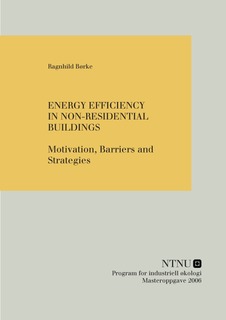Energy efficiency in non-residential buildings: Motivation, barriers and strategies
Master thesis
Permanent lenke
http://hdl.handle.net/11250/242593Utgivelsesdato
2006Metadata
Vis full innførselSamlinger
Sammendrag
In the thesis, causes of the energy efficiency gap, i.e. that seemingly attractive investments in energy efficiency are systematically passed over are explored, and policy instruments and business strategies that can be used to overcome this inefficiency are discussed. The economic literature of the efficiency gap focuses either on factors that are not included in the calculations of the gap, and that may explain why observed behaviour is actually efficient, or market failures that justifies policy intervention. In response to the economic literature, organizational and behavioural approaches have arisen, focusing on factors that preclude some of the assumptions made in economic theory.
A case study of four organizations has been carried out, investigating the decision processes, investment rules and motivation for energy efficiency measures. The main results are that all the organizations work systematically with energy observation and improving practices, while larger investments seem to be less prioritized. The building managers seem to cope with uncertainty by being conservative. Direct economic profitability is considered sufficient motivation for implementing energy-efficiency measures, while at the same time, the choice of investment objects is guided by strategic targets or general desirability. Capital-rationing occurs, but this competition among profitable projects is not considered a problem in the organizations. There is also some evidence of lack of incentives for energy conservation among occupants. A possible connection between emphasis on environmental results centrally in the organization and improvement in energy efficiency is established, and there are some indications that the start-up of an energy program depends on individuals.
The discussion of strategies to increase implementation of energy efficiency measures focuses on how to allow for technological change, and particularly diffusion of technologies. In this regard, looking for positive feed-back loops is important. A combination of market-based and behavioural instruments seems appropriate. Three specific strategies are explored: energy contracting, energy certificates and start-up help for arranging goals and routines for improvement.
